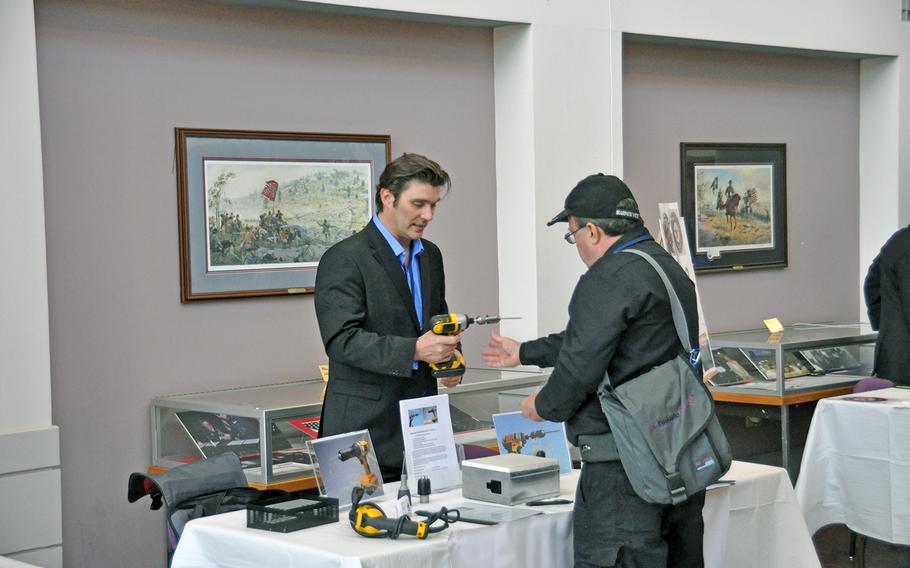
Army veteran Walter Nagel III shows off his "SHUR-A-TAK" universal screw attachment to a potential investor at the Veterans Venture Forum event on Oct. 29. The event paired veteran entrepreneurs with individuals and firms looking to invest in new start-ups. (Leo Shane III/Stars and Stripes)
WASHINGTON — Army veteran Walter Nagel III knows he has a $10 million business.
All he needs about $100,000 to get it started.
“It’s tough to get that,” the 39-year-old said. “You can never reach a venture capitalist unless another is interested in you.”
Nagel, who spent four years as an Army mechanic before becoming a civilian journeyman carpenter, developed a new universal screw attachment for cordless drills. Now, he’s hoping to make that into a career, chasing an entrepreneurial dream of becoming rich as his own boss.
It’s an appealing path for many veterans, whose military service left them unaccustomed to the traditional 9-to-5 shift. But success is difficult, according to officials at the Veterans Venture Forum.
The new group organized mentoring and training sessions this fall for would-be veteran entrepreneurs, in an effort to help them break into the business world.
The work culminated last week, when Nagel and 19 hopeful veterans pitched their business plans to a room full of “angel” investors with ready start-up cash.
As Nagel outlined his plans to manufacture and advertise his “SHUR-A-TAK” tool attachment, he was peppered with questions about its strength, its cost and its potential in the home improvement market.
Several potential investors wanted to know whether he had talked to larger corporations like Home Depot. Others wanted to chat with him privately on the side.
Doug Doan, a member of the Angel Venture Forum -- which partnered with the National Defense University Foundation for the event -- said investors like the idea of working with businesses owned by veterans because of their drive and ingenuity.
But the lack of civilian business connections has been a barrier to developing that talent, he said. As more troops from the current wars leave the military, creating a pipeline of veteran entrepreneurs -- and investors -- will be a needed and profitable effort.
The first round of veterans in the new Forum program included the veterans behind the growing RideScout phone app, which aggregates private and public transportation options in cities across the country; the founder of Valor Services, a veteran head-hunting firm; and a Navy nuclear physics expert who just launched an electronics firm.
None received million-dollar checks on that day, though several said they walked away with solid leads on potential investors.
That included Nagel, whose screw-gun tool attachment drew curiosity not just as a money-making venture but also as a solution to several investors’ home improvement projects. The inventor happily showed it off to anyone interested, gathering business cards and phone numbers at the same time.
“I don’t know how I ever would have met these investors without this kind of event,” he said. “But now I feel like I’m getting somewhere.”
shane.leo@stripes.com Twitter: @LeoShane